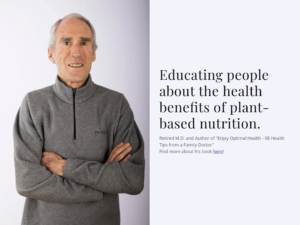Health column by Dr. Greg Feinsinger. Champion of Whole Food Plant Based Living and righteous person.
The International Conference on Nutrition in Medicine was held virtually this year from August 6th through 8th. One of the talks was by Kristi Funk, M.D., who is a breast surgeon, co-founder of the Pink Lotus Breast Center in Los Angeles, and author of the best-selling book “Breasts, The Owner’s Manuel.” She began her medical training in the early 90s and–as is all too common–she learned nothing about the power of healthy food to prevent cancer and many other diseases in all her years of medical and surgical training. Finally, in 2017, as she was doing research for her book, she found out about the strong link between lifestyle and breast cancer.
There has been a slow rise in breast cancer since 2004. Ninety five percent of breast cancer occurs in women over age 40. The median age is 62. One out of 8 women eventually get breast cancer. The incidence goes up with age, with women age 70-80 having the highest incidence, and risk gradually dropping off after age 80.
Women often think they don’t have to worry about breast cancer if they have a negative family history. However, although women with the BRACA gene mutation have an 87 percent increased risk of breast cancer, only 5 to 10 percent of breast cancer has a genetic component. Almost 90 percent of women with breast cancer don’t have a first degree relative (sibling or parent) with breast cancer.
Although many lay people as well as medical professionals don’t know this, regular exercise and a plant-based, whole (unprocessed) food diet lowers the risk of breast cancer. For example, Japanese women on their traditional diet used to have a very low rate of breast cancer compared to women on a Western diet. As Western food became more prevalent in Japan, the incidence of breast cancer increased dramatically. Another example is a study in which 193,742 women were followed for 9.4 years, and those who ate red and processed meat (ham, bacon, lunch meat, sausage) had a 25 percent increased incidence of breast cancer. Eating grilled meat increased breast cancer risk even more.
Following are lifestyle factors that increase risk for breast cancer:
- post-menopausal estrogen treatment other than occasional locally-applied vaginal estrogen cream
- obesity: fat cells make estrogen and obese women have a 50-250 increased risk
- alcohol, which increases estrogen levels, impairs immune function (optimal immunity kills off cancer cells as soon as they form), and interferes with DNA repair
- eating meat including chicken and seafood; processed meat (bacon, sausage, ham, lunch meat) increases risk the most and eating grilled meat increases risk even further
- eating dairy, which contains IGF1 (insulin growth factor 1, which is important for growth of baby cows and baby humans but in adult humans causes cancer cells to propagate)
Following are lifestyle factors that decrease risk:
- regular exercise
- dietary fiber (as opposed to fiber supplements), which flushes excess estrogen out of the body
- eating a variety of vegetables, fruit, and unprocessed grains, which contain antioxidants and other cancer-fighting micronutrients
- soy products, which attach to estrogen receptors, preventing stronger, cancer-causing estrogens from attaching—Asian women on traditional high soy diets have a low risk of breast cancer
Following are Dr. Funk’s 10 breast superfoods: 1) cruciferous and green leafy vegetables; 2) dietary fiber, which is found in plant but not animal-based foods; 3) berries; 4) apples; 5) tomatoes; 6) mushrooms; 7) allium family vegetables—garlic, onions, leeks, shallots, chives scallions; 8) seaweed; 10) cacao.
For more information from Dr. Funk, go to her website LetsBeatBreastCancer.org, or read her book.

Leave a Reply